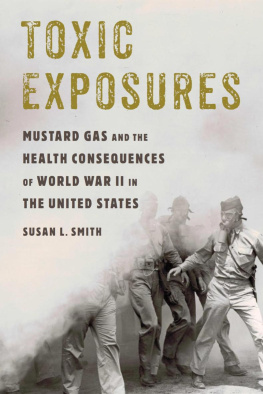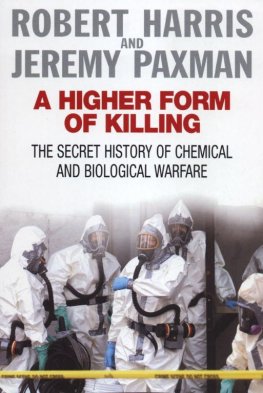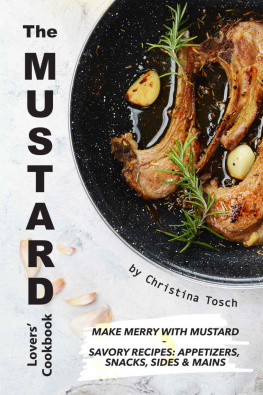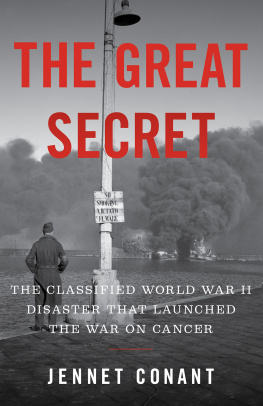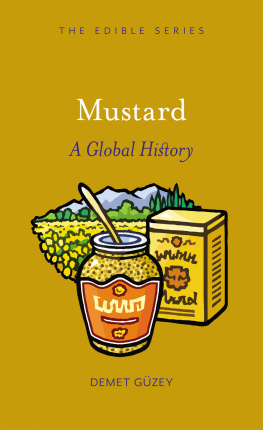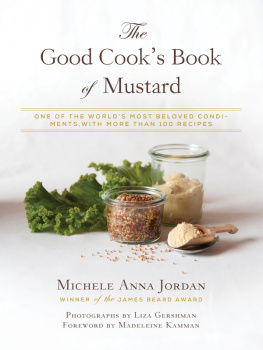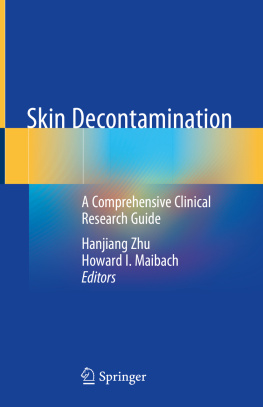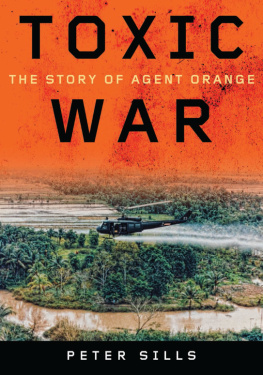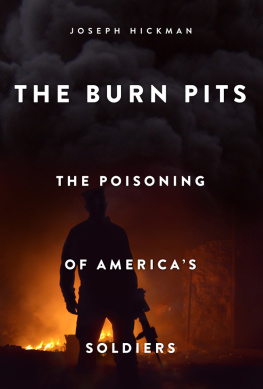Critical Issues in Health and Medicine
Edited by Rima D. Apple, University of WisconsinMadison, and Janet Golden, Rutgers University, Camden
Growing criticism of the US healthcare system is coming from consumers, politicians, the media, activists, and healthcare professionals. Critical Issues in Health and Medicine is a collection of books that explores these contemporary dilemmas from a variety of perspectives, among them political, legal, historical, sociological, and comparative, and with attention to crucial dimensions such as race, gender, ethnicity, sexuality, and culture.
For a list of titles in the series, see the end of the book.
Library of Congress Cataloging-in-Publication Data
Names: Smith, Susan L., author.
Title: Toxic exposures : mustard gas and the health consequences of World War II in the United States / Susan L. Smith.
Description: New Brunswick, New Jersey : Rutgers University Press, [2017] | Series: Critical issues in health and medicine | Includes bibliographical references and index.
Identifiers: LCCN 2016015515| ISBN 9780813586090 (hardback) | ISBN 9780813586113 (e-book (epub)) | ISBN 9780813586120 (e-book (web pdf))
Subjects: LCSH: Mustard gasToxicology. | Chemical weaponsUnited StatesTesting. | Gases, Asphyxiating and poisonous. | BISAC: HISTORY / Military / Biological & Chemical Warfare. | MEDICAL / History. | SCIENCE / History. | HISTORY / Military / World War II. | POLITICAL SCIENCE / Political Freedom & Security / Human Rights. | HISTORY / United States / 20th Century.
Classification: LCC RA1247.M8 S65 2017 | DDC 615.9/1dc23
LC record available at https://lccn.loc.gov/2016015515
A British Cataloging-in-Publication record for this book is available from the British Library.
Copyright 2017 by Susan L. Smith
All rights reserved
No part of this book may be reproduced or utilized in any form or by any means, electronic or mechanical, or by any information storage and retrieval system, without written permission from the publisher. Please contact Rutgers University Press, 106 Somerset Street, New Brunswick, NJ 08901. The only exception to this prohibition is fair use as defined by U.S. copyright law.
Visit our website: http://rutgerspress.rutgers.edu/
I want to thank the many people who have provided such tremendous support to me on this research and writing journey. I could not have done it without the assistance of family, friends, and colleagues at home and abroad.
I want to thank Donald Macnab for his love and confidence that I could finish this book. Donald, an outstanding researcher, also found some of the sources for this project and read the entire manuscript. In addition, I appreciate the love of my family in Canada, including my wonderful adult children Erin, Andreas, and Caitlin, and their partners. In the United States, I am blessed with strong family support, including from my Aunt Norma and my late Aunt Carole, my brothers, Jerry and Larry, and their spouses, Maudy and Ann. Finally, I thank Dennis and Patricia Edney, who have shared their unwavering love and made us part of their family.
In Edmonton, I have been blessed to be part of a community of extraordinary scholars who have become some of my dearest friends. They read drafts of grant proposals, attended talks, read chapters, and sometimes just chatted with me about my ideas. Their encouragement and feedback was vital to this project. I wish to thank Laurie Atkin, Lesley Cormack, Sara Dorow, Andrew Ede, Brian Evans, Judy Garber, Dawna Gilchrist, Susan Hamilton, Lois Harder, Jaymie Heilman, Karen Hughes, David Marples, Ann McDougall, Liza Piper, Pat Prestwich, Daphne Read, Sharon Romeo, Robert Smith, and Teresa Zackodnik. I also appreciate the support of other colleagues at the University of Alberta, including Sarah Carter, Beverly Lemire, Rod McLeod, Ken Moure, Melinda Smith, and Linda Trimble.
I want to acknowledge the tremendous encouragement I have received both professionally and personally from American and Canadian friends who have supported this project and whose scholarship inspires me in so many ways. I thank Emily Abel, Rima Apple, Charlotte Borst, Roger Daniels, Jackie Duffin, Erika Dyck, Eve Fine, Vanessa Northington Gamble, Janet Golden, Geoff Hudson, David Jones, Susan Lederer, Susan Lindee, Paul Lombardo, Laura McEnaney, Leslie Reagan, Susan Reverby, Leslie Schwalm, and Nancy Tomes. In addition, Florian Schmaltz at the University of Frankfurt on Main, Germany, and Daniel Immerwahr of Northwestern University kindly shared resource material with me. In particular, I want to thank Jaymie Heilman and Arleeen Tuchman, who at key moments responded to my writing challenges with such wisdom and kindness. Furthermore, I wish to acknowledge Mariamne Whatley and Nancy Worcester, whose friendship has been so important and who taught me so much about the politics of health. Finally, I want to acknowledge the intellectual powerhouses who taught me how to do history: Judy Leavitt, Linda Gordon, and the late Gerda Lerner.
It has been a pleasure to work with Rutgers University Press. Janet Golden and Rima Apple long ago believed in this project and encouraged me to submit it for their series. I have had the pleasure of working with senior editor Peter Mickulas, whose patience and professionalism is unsurpassed. Peter has made the publication process enjoyable. Finally, I thank the external reviewers for their extremely helpful comments and questions, and the copyeditor, Gary Von Euer. Any errors in the book that remain are, of course, my own.
I also want to recognize the undergraduate and graduate students who have played such an important role in inspiring and aiding my research. I especially thank the students in my courses on American medical history, including Erin Balcolm, Allison Barr, Sarah Baugh, Merissa Daborn, Erin Gallagher-Cohoon, Lauren Gnanasihamany, Letitia Johnson, Caroline Lieffers, Lauren Markewicz, Stephen Mawdsley, and Anna OBrien. The students interest and questions helped to launch and inspire this research project. For research assistance, I thank David Dolff, Leslie Holmes, Lauren Maclean, Stephen Mawdsley, Anna OBrien, Peter Sims, and Katherine Zwicker. Katherine Zwicker, who completed a dissertation on the history of radiation research, provided ideas and suggestions for sources, as well as her friendship. Finally, my dear friend Stephen Mawdsley was a model MA student, remarkable research assistant, and efficient coauthor. Stephen, who completed a PhD from the University of Cambridge and a book on the history of polio, recently joined the University of Strathclyde in Glasgow, Scotland. They are very lucky to have this impressive scholar.
Over the years I have disseminated my research findings at a range of academic events and public venues in the United States and Canada, and I want to express my gratitude to the organizers and audience members. In addition, I want to acknowledge the assistance provided by archivists and librarians at the following locations: US National Archives in College Park, Maryland (Tab Lewis and Mitch Yockelson), the National Academy of Sciences (Janice Goldblum), the Historical Collections of the New York Academy of Medicine (Arlene Shaner and Chris Warren), the Rockefeller Archive Center in New York (Margaret Hogan), the Directorate of History and Heritage for National Defence and Library and Archives Canada, both in Ottawa; and the University of Alberta Archives (Jim Franks). I am also grateful for the research information provided by Dr. John Fenn, retired professor of surgery, and Melissa Grafe, librarian for medical history, at Yale University.

